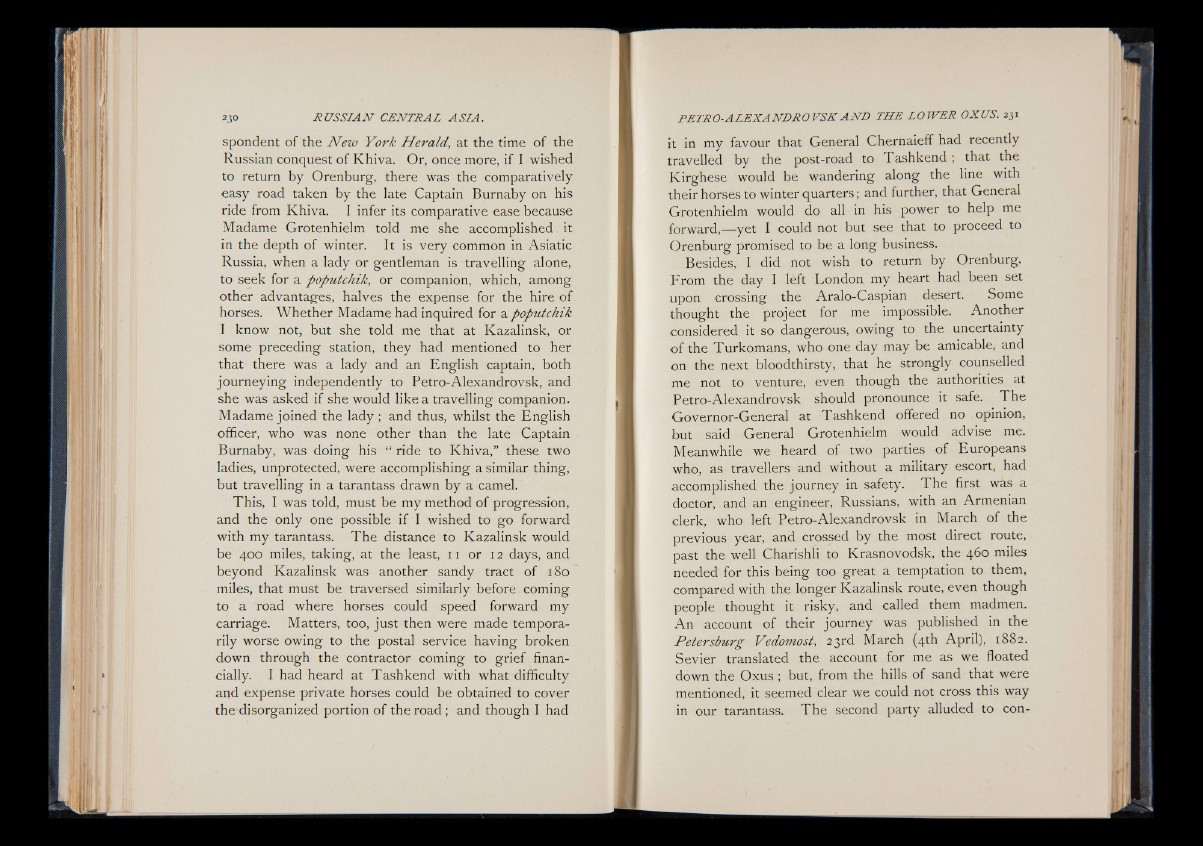
spondent of the New York Herald, at the time of the
Russian conquest of Khiva. Or, once more, if I wished
to return by Orenburg, there was the comparatively
easy road taken by the late Captain Burnaby on his
ride from Khiva. I infer its comparative ease because
Madame Grotenhielm told me she accomplished it
in the depth o f winter. It is very common in .Asiatic
Russia, when a lady or gentleman is travelling alone,
to seek for a poputchik, or companion, which, among
other advantages, halves the expense for the hire of
horses. Whether Madame had inquired for a poputchik
I know not, but she told me that at Kazalinsk, or
some preceding station, they had mentioned to her
that there was a lady and an English captain, both
journeying independently to Petro-Alexandrovsk, and
she was asked if she would like a travelling companion.
Madame joined the lady ; and thus, whilst the English
officer, who was none other than the late Captain
Burnaby, was doing his “ ride to Khiva,” these two
ladies, unprotected, were accomplishing a similar thing,
but travelling in a tarantass drawn by a camel.
This, I was told, must be my method of progression,
and the only one possible if I wished to go forward
with my tarantass. The distance to Kazalinsk would
be 400 miles, taking, at the least, 11 or 12 days, and
beyond Kazalinsk was another sandy tract of 180
miles, that must be traversed similarly before coming
to a road where horses could speed forward my
carriage. Matters, too, just then were made temporarily
worse owing to the postal service having broken
down through the contractor coming to grief financially.
I had heard at Tashkend with what difficulty
and expense private horses could be obtained to cover
the disorganized portion of the road; and though I had
it in my favour that General Chernaieff had recently
travelled by the post-road to Tashkend ; that the
Kirghese would be wandering along the line with
their horses to winter quarters; and further, that General
Grotenhielm would do all in his power to help me
forward,— yet I could not but see that to proceed to
Orenburg promised to be a long business.
Besides, I did not wish to return by Orenburg.
From the day I left London my heart had been set
upon crossing the Aralo-Caspian desert. Some
thought the project for me impossible. Another
considered it so dangerous, owing to the uncertainty
o f the Turkomans, who one day may be amicable, and
on the next bloodthirsty, that he strongly counselled
me not to venture, even though the authorities at
Petro-Alexandrovsk should pronounce it safe. The
Governor-General at Tashkend offered no opinion,
but said General Grotenhielm would advise me.
Meanwhile we heard of two parties of Europeans
who, as travellers and without a military escort, had
accomplished the journey in safety. T h e first was a
doctor, and an engineer, Russians, with an Armenian
clerk, who left Petro-Alexandrovsk in March of the
previous year, and crossed by the most direct route,
past the well Charishli to Krasnovodsk, the 460 miles
needed for this being too great a temptation to them,
compared with the longer Kazalinsk route, even though
people thought it risky, and called them madmen.
An account of their journey was published in the
Petersburg Vedomost, 23rd March (4th April), 1882.
Sevier translated the account for me as we floated
down the Oxus ; but, from the hills of sand that were
mentioned, it seemed clear we could not cross this way
in our tarantass. T h e second party alluded to con